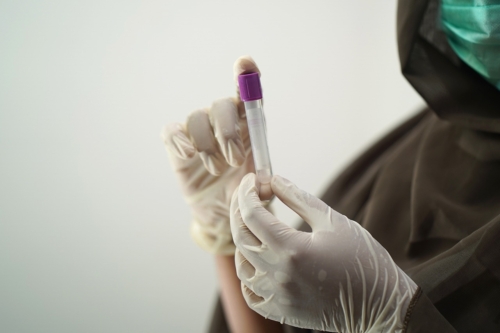France: Hôtel-Dieu hospital in Paris offers migrants free tests for STIs, hepatitis B and C and HIV

The Hôtel-Dieu hospital in Paris offers checks for sexually transmitted infections (STI) such as chlamydia, gonorrhea, syphilis, hepatitis B and C and HIV. The service is free and open to all, including undocumented migrants without healthcare coverage in France.
Herman, 27, just did a blood test in the Hôtel-Dieu hospital’s sexual health department, in the center of Paris. He will get the results in a week.
"My girlfriend asked me to do an HIV test," says the young Guinean who has been in France for three years. "She lost her mother when she was very young, and she recently learned her mother died of AIDS. She did the test a month ago and it was negative. Now it’s my turn. None of my girlfriends were sick that I know of, but I prefer to check." AIDS is the autoimmune disease one can develop after becoming infected with HIV.
In this health center of the Paris hospital network, STI checks are free and anonymous. "We accept all, without conditions," says Dr. Florence, co-administrator of the center. There is no need to have healthcare coverage to get treated here. Undocumented migrants have as much of a right to access to this service as other people.
Free with or without an appointment
The center has a phone translation service, allowing it to welcome foreigners who do not speak French.
"People can get an appointment by email (in French and in a foreign language) or on Doctolib, or come here without an appointment," says Dr. Florence.
In the center, a team made up of a dermatologist, gynecologist, a psycho-sexologist, nurse, a couple’s counsellor and a social worker offer STI checks and treatments to prevent infections. They can prescribe Pre-Exposure Prophylaxis (PrEP), a pill which can prevent one from getting HIV. They also offer specialized medical consultations, but those are not always free.
Keeping Hepatitis B under a close watch
The center can give treatment for syphilis, hepatitis B and C, and HIV.
"The number of hepatitis B cases is more significant in Sub-Saharan Africa and South-East Asia," says Dr. Delphine Mattei, who does day consultations. Migrants coming from those regions are particularly exposed to those infections.
Blood tests are useful to know if the patient was infected with hepatitis B and healed from it, or if they are chronically ill, so that they can be followed or simply kept under watch if the disease is dormant. "One should not hesitate to ask their partner to get vaccinated [there is a vaccine against hepatitis B]," adds Dr. Mattei.
Self-testing kits for HIV detection
According to French health statistics, many migrants get infected with HIV after arriving in France, after unprotected sex.
Traditional blood test or rapid tests at the center are ways to detect the virus. "We also have self-testing testing kits [from a blood drop] that people can take home to for their partner, relatives or friends to do it from their homes," adds Dr. Florence.
Last year, some 37 HIV cases were detected in the center, a quarter of which were pregnant women. The women were tested during their pregnancy check-ups.
The center is next to a pregnancy center (centre de protection maternelle (CPM) Cité) where many pregnant women experiencing poverty or homelessness seek medical, psychological, and social care.
Migrant women are particularly at risk of being infected with HIV in France. Economic precarity makes them particularly vulnerable to sexual violence in France, which multiplies their risk of contracting HIV by four, according to a 2018 study.
The sexual health center staff is also trained to recognize violence and can offer psychological help if need be.
HIV remains taboo among African migrants
In some cases, when pregnant women are accompanied by their partner, the partner also accepts to get tested. But the medical staff wish they would do that more often. "HIV is still taboo for some people, especially in Africa. People are afraid of being stigmatized and rejected in their family, so they do not get tested," says Dr. Florence.
"Today, many people live healthy lives with the virus without transmitting it to their partner thanks to medical treatment," says the doctor. "If people do not get tested, the virus can worsen, and they risk transmitting it to others."
"There’s no shame in getting an STI when one has an active love life," says Dr. Florence. The most important is to wear a condom with the new partner from the beginning to the end of intercourse and to get tested regularly when you change sexual partners.”
Other less well-known STIs such as chlamydia and gonorrhea are also often detected and treated at the sexual health center.
Those STIs do not always provoke symptoms, such as urinary pain or a burning sensation or unusual yellow discharge for women. Nevertheless, those two STIs need to be taken seriously because they can cause infertility for women and testicular infections for men. They are detected by sampling urine and swabbing the vagina, throat, or anus.
One can get STI tested and treated for free in France at any CeGIDD, and in many other places. Here is a website where you can find a place near you.
Hôtel-Dieu’s sexual health center
Phone: 0142348300 / Email : [email protected]
Hours : From 9 am to 7 pm from Monday to Friday, excepted Tuesday (open from 1:30 pm to 7 pm) with or without an appointment
Address : Hôtel Dieu, 1 place du Parvis Notre-Dame (6th floor – galerie A1), Paris. Metro stop : Cité (line 4) / Hôtel de Ville (lines 1 and 11) / Châtelet (lines 1, 4, 7 et 14).